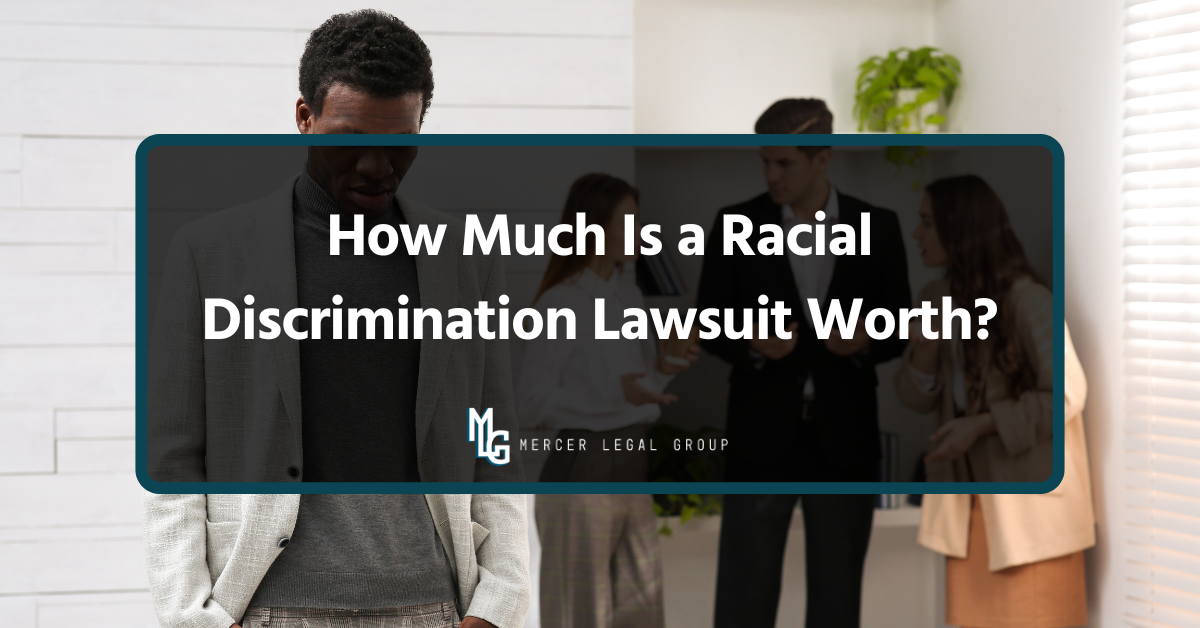How much a racial discrimination lawsuit is worth is primarily determined by factors such as lost wages, emotional distress, and the severity and duration of the discriminatory conduct. Courts and juries also consider punitive damages when the employer’s behavior was especially egregious or intentional. Additional factors like career impact, reputational harm, and strength of evidence can further influence the overall compensation.
At Mercer Legal Group, we have a team of seasoned employment attorneys who use tried-and-true legal strategies and guidance from the EEOC to accurately assess the value of racial discrimination claims. Our clients trust us due to our proven track record and in-depth understanding of discrimination laws. We’re committed to protecting your rights and maximizing your compensation with ethical, results-driven representation. Contact us today for a confidential consultation and take the first step toward justice.
In this post, we’ll break down how racial discrimination lawsuits are valued, investigate the factors that influence compensation, and give you a realistic idea of what to expect from a claim or settlement.
How Much Is a Racial Discrimination Lawsuit Worth?

The value of a racial discrimination lawsuit can vary widely, as it depends on several key factors that courts and negotiators consider when assessing compensation. Lost wages and money, as well as fringe benefits, are often a central component, covering income lost due to wrongful termination, demotion, or missed promotions.
Emotional distress, such as an employee’s emotional distress or humiliation caused by discrimination, can also significantly increase the potential employment discrimination damages award. In cases involving intentional or particularly appalling discrimination, a punitive damages award may be added to punish wrongdoing and deter future misconduct.
The strength of evidence is critical, as plaintiffs need to prove employment discrimination occurred to obtain maximum compensation. Other elements, such as career trajectory, reputational harm, and duration of discrimination, also shape the final award.
What Factors Influence Settlement Amounts in Racial Discrimination Cases?
Several key factors influence the settlement amount in a racial discrimination or workplace discrimination case. The severity of the discrimination is one of the primary determinants. Cases involving blatant, repeated, or egregious behavior, such as racial slurs or discriminatory termination cases, tend to result in higher compensation compared to isolated incidents.
The impact on the employee’s emotional and professional life, including stress, anxiety, or lost career opportunities, also plays a significant role in increasing the settlement value. A strong case supported by detailed documentation, witness testimony, and prior complaints often leads to higher settlements, reflecting the average settlement amounts for cases involving race discrimination reported in similar circumstances.
Without strong evidence, plaintiffs may face challenges in proving their claims, which can result in lower expected compensation. This is why cases with well-documented incidents of discrimination tend to reach more favorable settlements, reflecting the average settlement amounts for racial discrimination lawsuits reported in similar circumstances.
The duration of a racial discrimination case can significantly affect settlement values. Longer cases often involve higher legal costs, extended emotional harm, and additional lost pay. Settlements are typically structured to compensate the plaintiff fairly while avoiding the uncertainty of an employment discrimination trial.
Settlements are typically structured to compensate the plaintiff fairly while avoiding the uncertainty and expense of a trial. As a result, average settlement figures for racial discrimination lawsuits often reflect a combination of lost wages, emotional distress, and punitive considerations, making it important for both employees and employers to understand these factors when anticipating potential compensation and negotiating settlements.
What Types of Damages Are Awarded in a Racial Discrimination Lawsuit?
In a racial discrimination lawsuit, plaintiffs can receive several types of damages designed to address the harm they suffered. The most common are compensatory damages, which cover tangible losses such as lost wages, missed promotions, or reduced benefits resulting from the discriminatory conduct.
These damages are intended to restore the plaintiff to the financial position they would have been in if the discrimination had not occurred, making up a significant portion of racial discrimination lawsuit compensation. Economic losses often form the basis of recovering lost pay damages.
Another important component is the emotional distress damage award, which compensates for the psychological impact of discrimination. Victims often feel anxious, depressed, humiliated, or like they are in a hostile work environment. These damages are meant to make up for the personal pain caused by the discriminatory behavior. Courts carefully evaluate the severity and duration of the emotional harm when determining the appropriate award.
In addition, punitive damages may be awarded in cases where the employer’s conduct was intentional, malicious, or especially egregious. Unlike compensatory or emotional distress damages, punitive damages are meant to punish the wrongdoer and deter similar behavior in the future, adding another layer to overall racial discrimination lawsuit compensation. Understanding these types of damages ensures that plaintiffs pursue all avenues of recovery for employment discrimination damages.
What Determines the Value of a Racial Discrimination Case?

The value of a racial discrimination lawsuit hinges on several key elements. Compensatory damages, which are based on lost wages, missed promotions, and reduced benefits, are especially significant when the awarded lost pay fully reflects the financial harm suffered.
Employees’ civil rights violations, situations where an employer intentionally discriminates, and the strength of supporting evidence are all considered, guided by what employment discrimination laws provide to protect workers. Together, these factors help calculate overall potential compensation, giving plaintiffs a realistic sense of the case’s worth.
Courts and negotiators also consider the severity and duration of the discriminatory behavior, the credibility of evidence, and whether punitive damages are appropriate for particularly egregious conduct. Together, these elements help calculate overall potential compensation, giving plaintiffs and employers a realistic sense of the case’s value.
How to Calculate Compensation for a Racial Discrimination Lawsuit?
Calculating the potential compensation for a racial discrimination lawsuit involves assessing both economic and non-economic losses. Economic losses include tangible damages such as lost wages, missed promotions, reduced benefits, and any out-of-pocket expenses directly resulting from the discriminatory conduct. These economic losses are usually the easiest to quantify and serve as the basis for determining the lawsuit’s value.
Non-economic impacts cover emotional distress, damage awards, and reputational harm. Additionally, legal costs like an employee’s reasonable attorney’s fees and court expenses also influence the final award. By analyzing economic, non-economic, and legal factors, plaintiffs can estimate the potential value of their employment discrimination claim.
What Are the Hidden Costs of Racial Discrimination Lawsuits?
Racial discrimination lawsuits often involve more than just the visible financial claims. Legal fees, including employees’ reasonable attorneys’ fees, can accumulate quickly, especially in complex cases that require extensive evidence and expert testimony. Beyond the financial investment, the time commitment is considerable, as gathering documentation, attending hearings, and coordinating with legal counsel can disrupt both work and personal life.
Emotional strain is another often-overlooked cost. Plaintiffs may also face public scrutiny or stress from navigating employment discrimination laws. Factors such as lawsuit costs, attorney fees, time commitment, and the emotional toll can all impact whether a case is financially and personally feasible, emphasizing the importance of thorough preparation before filing.
Are There Limits on Racial Discrimination Settlements?

In racial discrimination cases, settlement amounts are generally negotiated between the parties, and there are usually no strict caps on how much a plaintiff can receive. However, some state laws, including related state laws and federal limits, impose caps on punitive or compensatory damages. These state-specific limits can influence negotiations, as larger potential awards may be reduced to comply with statutory restrictions.
Precedent cases, Equal Employment Opportunity Commission (EEOC) findings, and employment discrimination laws guide realistic awards. These cases help establish a benchmark for what is considered reasonable, indirectly affecting settlement limits even when statutory caps do not apply.
While there are legal restrictions on certain components of compensation, many parts of a racial discrimination settlement, such as back pay, lost benefits, and attorney fees, are typically uncapped. Understanding both statutory limits and case law precedent allows plaintiffs and their attorneys to better anticipate realistic settlements and negotiate fair compensation within the legal framework.
How Do Precedent Cases Impact Racial Discrimination Settlements?
Precedent-setting cases establish benchmarks for settlement values, especially when courts evaluate summary judgment motions that often shape the direction of a discrimination lawsuit. Courts consider prior rulings involving severe workplace discrimination, employer size, evidence strength, and calculations such as how much lost pay a plaintiff can recover, all of which influence case value.
Influential cases with large awards or clear findings of discrimination establish expectations for both plaintiffs and employers, guiding how similar pay claims are valued. These cases also clarify how courts interpret laws regarding compensatory, emotional distress, and punitive damages, helping attorneys predict likely outcomes.
Judicial trends in most employment discrimination cases inform negotiation tactics and guide plaintiffs seeking to recover money damages under relevant employment act statutes. If courts have consistently awarded higher compensation in certain types of discrimination claims, this can increase the settlement value in similar cases and encourage plaintiffs to pursue more favorable terms. Understanding these legal trends allows both parties to assess risk, anticipate likely outcomes, and structure settlements that reflect established case law.
How to Maximize Compensation in Racial Discrimination Cases?

Employment discrimination cases arise when employers violate civil rights, and pursuing claims ensures justice and fair employment discrimination damages. Maximizing compensation in a racial discrimination case starts with gathering and presenting strong evidence.
Detailed documentation of discriminatory incidents, witness statements, emails, performance reviews, and prior complaints can significantly strengthen a claim. Clear, well-organized evidence not only demonstrates the severity of the discrimination but also supports higher damages for lost wages and emotional distress, making it a key element of any legal strategy for maximizing compensation.
Effective negotiation tactics are another critical factor in enhancing settlement outcomes. Skilled negotiators can leverage evidence, highlight potential risks to the employer, and structure settlements that include both economic and non-economic damages. Understanding the employer’s priorities and timing the negotiation process carefully can result in more favorable terms, helping plaintiffs achieve compensation that more accurately reflects the harm suffered.
Selecting the right attorney familiar with employment discrimination laws is equally important in a successful legal strategy, especially when addressing common questions employment lawyers receive about how much a racial discrimination lawsuit is worth. Experienced employment law attorneys understand how courts value claims, including losses involving money and fringe benefits, are familiar with precedent cases, and know how to advocate effectively for both compensatory and punitive damages.
They also recognize when plaintiffs may need professional counseling services to document emotional harm and strengthen their overall claim. By combining strong evidence, strategic negotiation, and expert legal guidance, plaintiffs can significantly improve their chances of maximizing compensation in a racial discrimination lawsuit.
How Do Attorneys’ Fees Maximize Compensation in Racial Discrimination Cases?
Attorneys’ fees play a crucial role in maximizing compensation in racial discrimination cases, as they allow plaintiffs to access skilled legal representation without bearing prohibitive upfront costs. Many employment law attorneys work on a contingency fee basis. This means they are paid a percentage of the settlement or award, which aligns the attorney’s incentives with the client’s goal of obtaining the highest possible compensation. This structure enables plaintiffs to pursue claims they might otherwise forgo due to legal costs, while also encouraging attorneys to dedicate the necessary resources and expertise to building a strong case.
A careful cost-benefit analysis of attorneys’ fees is also essential for maximizing case value. Experienced attorneys leverage their knowledge of precedent cases, negotiation tactics, and courtroom strategies to enhance the potential award, often recovering amounts that far exceed the costs of legal representation. By effectively managing legal costs and strategically using their expertise, attorneys help secure economic, non-economic, and compensatory damage awards, ensuring plaintiffs recover full value.
Preparing to Seek Legal Justice Against Racial Discrimination?
The value of a racial discrimination lawsuit depends on factors like lost wages, emotional distress, the seriousness of the discrimination, and the strength of the evidence. Punitive damages may apply in intentional or egregious cases, and state laws or past case outcomes can influence potential awards. Together, these elements help shape realistic settlement expectations and guide plaintiffs in preparing their claims.
Maximizing compensation involves strategic actions such as gathering strong evidence, selecting the right attorney, and employing effective negotiation tactics. Attorneys’ fees often work on a contingency basis, allowing plaintiffs to access expert legal guidance while managing legal costs. While there are generally no strict caps on settlements, some state-specific limits may apply to certain damages. Being informed about these factors ensures plaintiffs can pursue fair and comprehensive racial discrimination lawsuit compensation.
Are you wondering how much a racial discrimination lawsuit might truly be worth? At Mercer Legal Group, our experienced employment attorneys use evidence-driven strategies, strong negotiation skills, and a deep understanding of federal and state discrimination laws to help clients maximize compensation. If you believe you’ve been discriminated against, take action against racial discrimination and protect your rights. Contact us today for a confidential consultation.
FAQs
If you’re considering filing a racial discrimination claim, it’s natural to wonder how much your case might be worth. Below are answers to some of the most common questions about potential compensation, settlement limits, and factors that affect case value.
What Factors Determine the Value of a Racial Discrimination Lawsuit?
Factors include lost wages, emotional harm, punitive damages, and employer discrimination, as well as the strength of supporting evidence. Courts also consider career setbacks, health issues, and whether claims involve violations of the Equal Pay Act or other employment discrimination laws.
How Much Compensation Can I Expect From a Racial Discrimination Lawsuit?
Amounts vary, typically from a few thousand dollars to hundreds of thousands, depending on emotional distress, lost pay, and punitive damages. Cases involving race discrimination, gender discrimination, or age discrimination may command higher settlements.
What Are the Limits on the Amount That Can Be Awarded in a Racial Discrimination Lawsuit?
Federal law caps certain damages, but recoverable money damages, back pay, and attorney fees are often uncapped. The Equal Employment Opportunity Commission, the Equal Pay Act, or another applicable statute may also influence how certain damages are calculated.
Are There Limits on the Amount That Can Be Settled in a Racial Discrimination Case?
Settlements are negotiated and depend on severity, evidence, and damages. Otherwise neutral employment policies or violations of employment discrimination laws can also influence settlement size.





